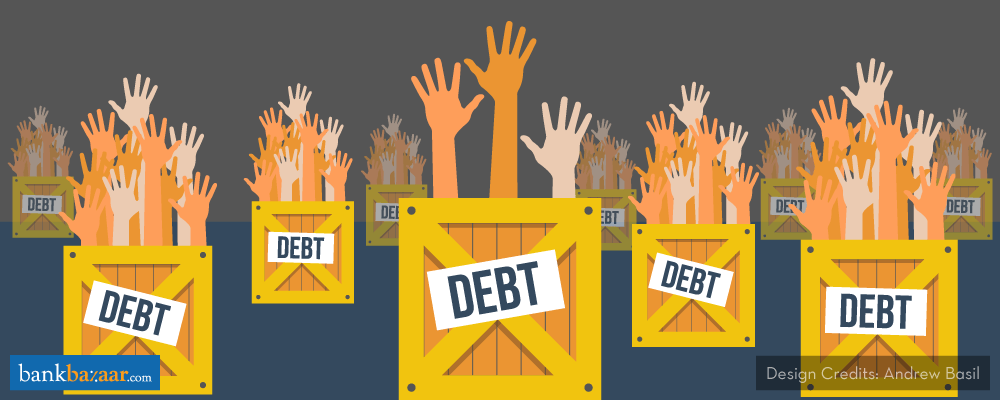
The concept of debt comes in when you fall short of funds while undertaking crucial decisions like buying a home, financing education or planning to own any other essential goods. In the endeavour to fulfil these significant life decisions, you depend on borrowed money from a lending institution, which becomes a debt. Not all debts are unwanted, some are planned and a few arise out of a sudden emergency or situation beyond your control. A sudden loss of a job or a medical emergency may catch anyone off guard pushing toward unwanted debt despite a contingency fund. While the reason for unwanted debt could vary from person to person, they are to be taken care of at the earliest. Availing too many loans at high-interest rates and delay in repayment can easily lead to a debt trap.
Let’s look at a few ways in which you can get rid of such debts and save yourself from a financial crisis.
Assessment Of Existing Debt Situation
Before you take any steps, it’s important that you assess your existing financial situation. This would help you to understand how much you have and how much you need. You need to chalk out a plan based on your situation. If your expenses are high, you might have to cut down on them. On the other hand, if you have other loans to pay off, you might need to prioritise repayment of some over the other.
Your existing income, expenses, corpus in hand, upcoming financial responsibilities and repercussions of closing or not closing the loan are some of the factors you must consider before coming up with a repayment plan.
Set Your Debt Elimination Plan
You should make a debt elimination plan based on the liabilities on your account. If you have too many loans in your account to be taken care of, try prioritising the ones with high-interest charges such as Personal Loan or Credit Card debt. Check the prepayment penalty and figure out the payment permutations that can help you save more money.
Let’s look at the table below to ascertain how you can save money by clearing a particular debt. The loan amount and the tenure are the same in Case I and II. The interest rate is high in Case I due to which, many people may prefer to close the loan first but there is a prepayment penalty of 2%. In Case II, there are no penalties. Thus the savings in Case II is higher than Case I.
| Details | Case I (High Interest with prepayment penalty) |
Case II (Relatively low Interest and no prepayment penalty) |
| Outstanding Loan Amount (In Rs) | 300000 | 300000 |
| Prepayment Penalty | 2.00% | NIL |
| Tenure remaining (In Months) | 13 Months | 13 Months |
| Interest Rate (Pa) | 14% | 12% |
| Total amount payable in 13 months | ||
| If prepaid, Pay off completely (Amount with one-month interest) (In Rs) | 303500 | 303000 |
| Prepayment Penalty (In Rs) | 5570 | NIL |
| A. Total Prepayment required (In Rs) | 309070 | 303000 |
| B. Total amount payable in remaining tenure i.e. 13 EMIs (If not prepaid) (In Rs) | 325068 | 321418 |
| (B-A) Amount saved due to prepayment (In Rs) | 15998 | 18418 |
*Rates and data are indicative for illustrative purpose
Pre-payment penalty, remaining tenure and interest rate are some of the important factors that you must consider while making a debt elimination plan.
Setting The Budget
Before you start diverting money towards repayment of a loan, chalk out a budget to ensure your regular needs are taken care of. You don’t want to get into another debt to repay the existing debt. So, plan your repayment by adjusting your financial plan accordingly. Budgeting can help you cut down on unnecessary expenses and save up for clearing the loan.
Saving Extra Cash Can Be Motivating
Make sure you utilise every extra penny you make towards repayment of the loan. This would include bonuses and performance rewards. You could also cut down on luxury expenses like weekend outing, buying high-end electronics and luxury products, etc. Saving more would motivate you to clear the debt quickly.
Repaying Systematically
Instead of panicking, plan your repayment systematically. Set your repayment priorities based on the interest rates associated with the loans you have to pay off. If the interest rate is low and stable, you needn’t cut short the tenure. Rather start with unsecured loans which directly impact the CIBIL score and charge a higher interest rate.
If all these steps fall flat, you can consider sourcing money from alternative sources such as liquidating existing investments, taking a loan from family and friends, etc. However, do analyse the impact the loan has on your credit score and financial objectives before you take such a drastic step.
BankBazaar is a leading online marketplace in India that helps consumers compare and apply for Credit Card, Personal Loan, Home Loan, Car Loan and insurance.